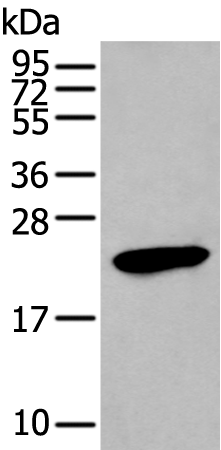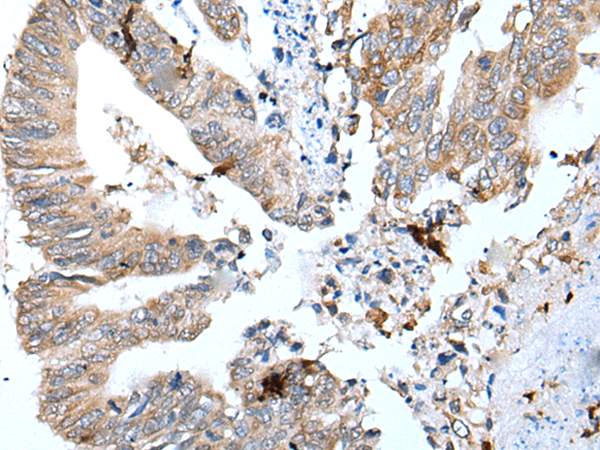

| WB | 咨询技术 | Human,Mouse,Rat |
| IF | 咨询技术 | Human,Mouse,Rat |
| IHC | 1/25-1/100 | Human,Mouse,Rat |
| ICC | 技术咨询 | Human,Mouse,Rat |
| FCM | 咨询技术 | Human,Mouse,Rat |
| Elisa | 1/5000-1/10000 | Human,Mouse,Rat |
| Aliases | FOV; CA11; AMP18; BRICD1; foveolin |
| WB Predicted band size | 22 kDa |
| Host/Isotype | Rabbit IgG |
| Antibody Type | Primary antibody |
| Storage | Store at 4°C short term. Aliquot and store at -20°C long term. Avoid freeze/thaw cycles. |
| Species Reactivity | Human |
| Immunogen | Synthetic peptide of human GKN1 |
| Formulation | Purified antibody in PBS with 0.05% sodium azide and 50% glycerol. |
+ +
以下是关于GKN1抗体的3篇参考文献的虚构示例(实际文献需通过学术数据库查询确认):
---
1. **文献名称**:*Gastrokine-1 (GKN1) suppresses gastric cancer cell proliferation and migration via TGF-β signaling pathway*
**作者**:Zhang Y, et al.
**摘要**:该研究利用GKN1特异性抗体检测其在胃癌组织中的表达,发现GKN1在肿瘤组织中显著下调。体外实验表明,GKN1过表达可通过抑制TGF-β/Smad信号通路降低癌细胞增殖和迁移能力,提示其作为肿瘤抑制因子的潜在作用。
2. **文献名称**:*GKN1 as a novel diagnostic biomarker for early-stage gastric cancer: Validation using immunohistochemistry*
**作者**:Tanaka K, et al.
**摘要**:研究通过GKN1抗体对胃黏膜活检样本进行免疫组化分析,证实GKN1在早期胃癌中的表达缺失与疾病进展相关。结果表明,GKN1联合其他标志物可提高早期胃癌的检出率。
3. **文献名称**:*Helicobacter pylori infection downregulates GKN1 expression through epigenetic modifications*
**作者**:Wang L, et al.
**摘要**:该文献探讨幽门螺杆菌感染与GKN1表达的关系,发现感染通过启动子甲基化抑制GKN1转录。使用GKN1抗体检测显示,患者胃黏膜中GKN1蛋白水平降低,可能与慢性炎症向胃癌转化相关。
---
如需真实文献,建议在PubMed或Google Scholar检索关键词:**GKN1 antibody**, **Gastrokine-1**, **gastric cancer biomarker**。
GKN1 (Gastrokine-1) is a secreted protein predominantly expressed in the gastric mucosa, particularly in surface mucous cells of the stomach epithelium. It plays a critical role in maintaining mucosal integrity, regulating inflammation, and promoting repair mechanisms in the gastrointestinal tract. GKN1 is involved in stabilizing the mucus layer, modulating immune responses, and interacting with pathogens like *Helicobacter pylori*. Its expression is often downregulated in gastric diseases, including gastritis, peptic ulcers, and gastric cancer, suggesting its potential as a biomarker or therapeutic target.
GKN1 antibodies are immunological tools developed to detect and quantify GKN1 protein levels in research and diagnostic contexts. These antibodies enable studies on GKN1's functional roles, such as its anti-inflammatory properties, involvement in epithelial cell differentiation, and suppression of tumorigenesis. They are utilized in techniques like Western blotting, immunohistochemistry, and ELISA to explore GKN1 expression patterns in healthy versus diseased tissues. Recent research also investigates GKN1 antibodies for their potential in therapeutic strategies, such as targeting pathways linked to gastric cancer progression or enhancing mucosal healing. However, challenges remain in standardizing antibody specificity and understanding GKN1's full mechanistic landscape, necessitating further validation and clinical exploration.
×